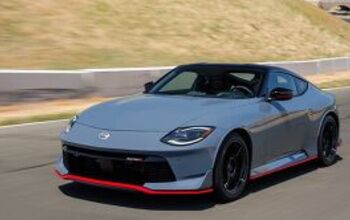Fisker Goes Public With Spartan Energy SPAC

Despite having never manufactured a single production model, Fisker Inc. is a company reportedly worth billions. On Thursday, the prospective automaker indicated that it was ready to see how much more it could get via an announcement that it had officially completed its business combination Spartan Energy Acquisition Corp — a special purpose acquisition company — and was ready to be publicly traded.
Better call your broker.
Listen, if we could explain to you why technology firms with no product lineups or revenue sources are eligible to receive cash enemas from the stock market, we absolutely would. But the amount of mental gymnastics required to rationalize an answer has surpassed what your author can entertain without risking his own sanity. Special purpose acquisition companies (aka SPACs or “blank check” firms) have exploded in popularity and allowed dozens of businesses going public to rake it in via reverse-mergers this year. Whether it’s economic voodoo or sheer madness, it has become the status quo for IPOs seeking to raise insane amounts of money.
Fisker is essentially the second coming of Fisker Automotive, which went bankrupt in 2014 after selling a few thousand luxury EVs, and is looking to reenter the automotive marketplace with as much financial backing as possible. Like most electric startups, any vehicles currently in its roster are mock-ups of what it eventually hopes to produce. Spartan Energy Acquisition Corp is funded by private equity and only exists to scoop up businesses. A common stock and public warrants are expected to commence trading on the New York Stock Exchange under the ticker symbols FSR and FSR WS, respectively.
“All the external pieces are now in place to execute our unique, asset-light business strategy, with today’s funding and the strategic cooperation announced with Magna on Oct. 15,” Fisker Chairman and Chief Executive Officer, Henrik Fisker, proclaimed. “We can now fully turn our attention to developing and launching the revolutionary, all-electric Fisker Ocean into the heart of the midsize SUV market, expected to commence in Q4 2022. We appreciate the confidence from all our shareholders and intend to deliver on our stated goals.”
The Fisker Ocean will be priced at a claimed $37,499 when it arrives, making it less than half as expensive as the old Fisker Karma. But we’re not convinced of anything until we see the brand building them and holding its own on the market for a while. Too many EV startups have fallen by the wayside already (e.g. Faraday Future, LeEco, Detroit Electric, Dyson, Bright Automotive, and more) despite having mountains of cash at their disposal.
[Image: Fisker Inc.]

A staunch consumer advocate tracking industry trends and regulation. Before joining TTAC, Matt spent a decade working for marketing and research firms based in NYC. Clients included several of the world’s largest automakers, global tire brands, and aftermarket part suppliers. Dissatisfied with the corporate world and resentful of having to wear suits everyday, he pivoted to writing about cars. Since then, that man has become an ardent supporter of the right-to-repair movement, been interviewed on the auto industry by national radio broadcasts, driven more rental cars than anyone ever should, participated in amateur rallying events, and received the requisite minimum training as sanctioned by the SCCA. Handy with a wrench, Matt grew up surrounded by Detroit auto workers and managed to get a pizza delivery job before he was legally eligible. He later found himself driving box trucks through Manhattan, guaranteeing future sympathy for actual truckers. He continues to conduct research pertaining to the automotive sector as an independent contractor and has since moved back to his native Michigan, closer to where the cars are born. A contrarian, Matt claims to prefer understeer — stating that front and all-wheel drive vehicles cater best to his driving style.
More by Matt Posky
Latest Car Reviews
Read moreLatest Product Reviews
Read moreRecent Comments
- W Conrad I'm not afraid of them, but they aren't needed for everyone or everywhere. Long haul and highway driving sure, but in the city, nope.
- Jalop1991 In a manner similar to PHEV being the correct answer, I declare RPVs to be the correct answer here.We're doing it with certain aircraft; why not with cars on the ground, using hardware and tools like Telsa's "FSD" or GM's "SuperCruise" as the base?Take the local Uber driver out of the car, and put him in a professional centralized environment from where he drives me around. The system and the individual car can have awareness as well as gates, but he's responsible for the driving.Put the tech into my car, and let me buy it as needed. I need someone else to drive me home; hit the button and voila, I've hired a driver for the moment. I don't want to drive 11 hours to my vacation spot; hire the remote pilot for that. When I get there, I have my car and he's still at his normal location, piloting cars for other people.The system would allow for driver rest period, like what's required for truckers, so I might end up with multiple people driving me to the coast. I don't care. And they don't have to be physically with me, therefore they can be way cheaper.Charge taxi-type per-mile rates. For long drives, offer per-trip rates. Offer subscriptions, including miles/hours. Whatever.(And for grins, dress the remote pilots all as Johnnie.)Start this out with big rigs. Take the trucker away from the long haul driving, and let him be there for emergencies and the short haul parts of the trip.And in a manner similar to PHEVs being discredited, I fully expect to be razzed for this brilliant idea (not unlike how Alan Kay wasn't recognized until many many years later for his Dynabook vision).
- B-BodyBuick84 Not afraid of AV's as I highly doubt they will ever be %100 viable for our roads. Stop-and-go downtown city or rush hour highway traffic? I can see that, but otherwise there's simply too many variables. Bad weather conditions, faded road lines or markings, reflective surfaces with glare, etc. There's also the issue of cultural norms. About a decade ago there was actually an online test called 'The Morality Machine' one could do online where you were in control of an AV and choose what action to take when a crash was inevitable. I think something like 2.5 million people across the world participated? For example, do you hit and most likely kill the elderly couple strolling across the crosswalk or crash the vehicle into a cement barrier and almost certainly cause the death of the vehicle occupants? What if it's a parent and child? In N. America 98% of people choose to hit the elderly couple and save themselves while in Asia, the exact opposite happened where 98% choose to hit the parent and child. Why? Cultural differences. Asia puts a lot of emphasis on respecting their elderly while N. America has a culture of 'save/ protect the children'. Are these AV's going to respect that culture? Is a VW Jetta or Buick Envision AV going to have different programming depending on whether it's sold in Canada or Taiwan? how's that going to effect legislation and legal battles when a crash inevitibly does happen? These are the true barriers to mass AV adoption, and in the 10 years since that test came out, there has been zero answers or progress on this matter. So no, I'm not afraid of AV's simply because with the exception of a few specific situations, most avenues are going to prove to be a dead-end for automakers.
- Mike Bradley Autonomous cars were developed in Silicon Valley. For new products there, the standard business plan is to put a barely-functioning product on the market right away and wait for the early-adopter customers to find the flaws. That's exactly what's happened. Detroit's plan is pretty much the opposite, but Detroit isn't developing this product. That's why dealers, for instance, haven't been trained in the cars.
- Dartman https://apnews.com/article/artificial-intelligence-fighter-jets-air-force-6a1100c96a73ca9b7f41cbd6a2753fdaAutonomous/Ai is here now. The question is implementation and acceptance.


































Comments
Join the conversation
"The amount of mental gymnastics required to rationalize an answer has surpassed what your author can entertain without risking his own sanity." Your skepticism of SPACs and other "financial engineering" products is warranted and appreciated. Keep up the good work.
If Fisker actually manages to (have Magna) build this thing at the promised price, it will be pretty rad. Especially if they come through on the innovative and cheap lease terms they are promising. But I have a feeling the mainstream electric SUV future will, for the next several years, consist of existing companies promising $30k cars on every corner...but actually delivering $50k+ cars in small quantities. Ford, VW, Volvo, Tesla.